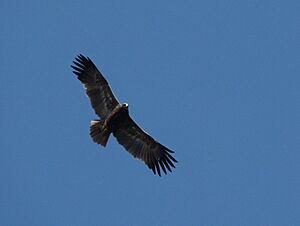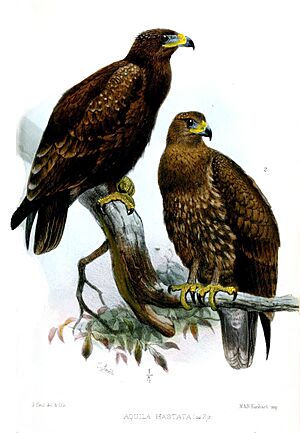Indian spotted eagle facts for kids
The Indian spotted eagle (scientific name: Clanga hastata) is a large bird of prey found in South Asia. Like other typical eagles, it belongs to a bird family called Accipitridae. Eagles are known for being powerful hunters with sharp eyesight.
Quick facts for kids Indian spotted eagle |
|
|---|---|
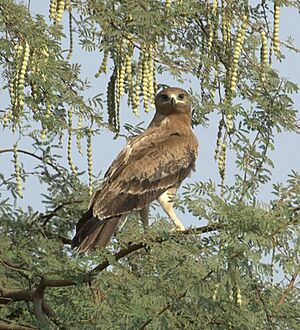 |
|
| Adult Indian spotted eagle | |
| Conservation status | |
| Scientific classification |
|
| Kingdom: | Animalia |
| Phylum: | Chordata |
| Class: | Aves |
| Order: | Accipitriformes |
| Family: | Accipitridae |
| Genus: | Clanga |
| Species: |
C. hastata
|
| Binomial name | |
| Clanga hastata (Lesson, RP, 1831)
|
|
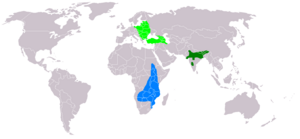 |
|
| Range of C. hastata in dark green | |
| Script error: The function "autoWithCaption" does not exist. | |
| Synonyms | |
|
Aquila hastata |
|
Script error: No such module "Check for conflicting parameters".
What Does the Indian Spotted Eagle Look Like?
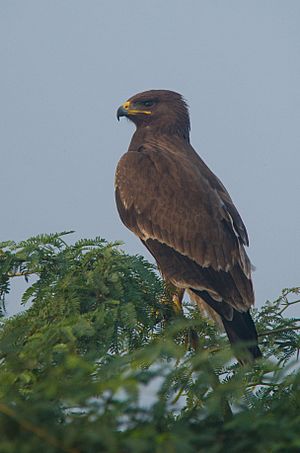
The Indian spotted eagle is about 60 centimeters (2 feet) long. Its wings can spread up to 150 centimeters (5 feet) wide. It has a wide head and a broad mouth. This eagle is generally lighter in color than its close relatives. Its eyes look darker than its feathers.
You can tell adult Indian spotted eagles apart from the greater spotted eagle by their lighter color and darker eyes. They also prefer different places to live. Young eagles look different. After three or four months, they are shiny brown. The tips of their head and neck feathers are creamy, making them look spotted. Their tail feathers are light brown with white stripes. They also have large creamy spots on their wings. After about 18 months, they shed their feathers and become darker. They also have fewer spots. Some older young eagles do not have many spots at all. This can make their common name a bit confusing!
Where Do Indian Spotted Eagles Live?
The Indian spotted eagle lives in Bangladesh, India, Myanmar, and Nepal. You can find them in areas with farms and in tropical dry forests.
How Scientists Study Indian Spotted Eagles
Scientists once thought the Indian spotted eagle was just a type of lesser spotted eagle. But now we know it is its own unique species. They found this out by looking at its body shape, how it acts, where it lives, and its DNA.
The Indian spotted eagle likely became a separate species about 3.6 million years ago. This happened during a time called the middle Pliocene period. At that time, glaciers and deserts grew in Central Asia. This split the eagle population into northern and southern groups.
These eagles were once placed in the genus Aquila, which means "true eagles." Now, scientists have given them their own separate genus, Clanga. A genus is a group of closely related species.
 | Delilah Pierce |
 | Gordon Parks |
 | Augusta Savage |
 | Charles Ethan Porter |



